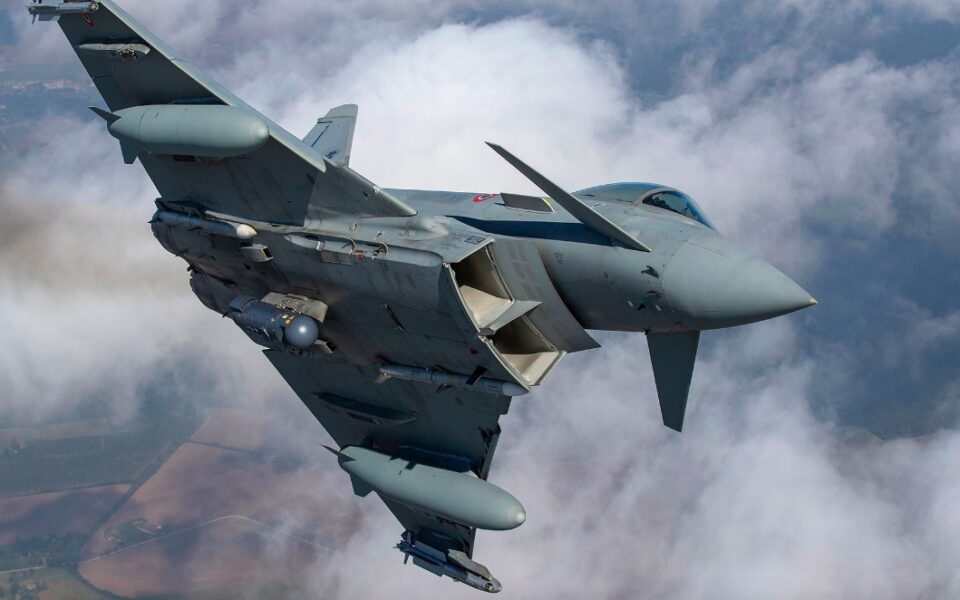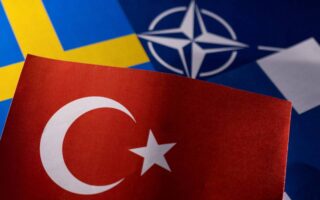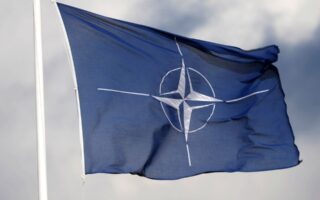Turkey’s fighter jet saga: The Eurofighter option and Berlin’s hesitation

The prolonged dispute over the delivery of F-16 fighter jets has been straining relations between Ankara and Washington for months, concurrently impeding Sweden’s NATO accession. The Turkish government’s evident frustration underscores Ankara’s urgent need for modern weapons technology to update its outdated air force. Historically reliant on the USA for fighter aircraft, Turkey is actively exploring alternatives.
In November, Turkey disclosed negotiations with the UK and Spain for the acquisition of 40 Eurofighter Typhoons, a cutting-edge fighter aircraft jointly manufactured by Germany, the UK, Spain, and Italy. Turkish Defense Minister Yasar Guler recently emphasized, “The Eurofighter is a very good alternative, and we want to buy it.”
Several motives drive Ankara’s newfound interest in the Eurofighter. Beyond being a proven system in Europe and the Arab world, the move signals Turkey’s desire to reduce dependence on Washington. Moreover, publicly expressing interest in Eurofighters serves as a tactical maneuver, conveying to the Americans that alternatives are being explored – a common practice in international arms negotiations.
However, challenges persist. The sale of Eurofighter aircraft necessitates the unanimous approval of all consortium members, including Great Britain, Germany, Spain, and Italy. While the British and Spanish have signaled approval, German opposition presents a hurdle. According to media reports, Berlin is under considerable pressure from London to abandon its restrictive stance towards Ankara. In a twist of fate, Germany, which once faced Greek resentment over submarine technology sales to Turkey, is now blocking weapons systems sales to Ankara, contrasting with London and Madrid’s push for the deal.
The German Foreign Minister’s announcement to end the blockade against Eurofighter deliveries to Saudi Arabia signifies a strategic policy shift and potential changes in Germany’s stance on weapons exports to conflict-involved countries.
It is significant – and has more than symbolic meaning – that the German Minister announced the end of the export blockade in Jerusalem of all places. Berlin’s new arms policy has a direct link to Israel and the war in Gaza: “The world, especially here in the Middle East, has become a completely different place since October 7,” said Annalena Baerbock, who – it should not be forgotten – belongs to a political party once considered pacifist and traditionally opposed to arms exports.
But that is now part of history: Berlin has reevaluated Saudi Arabia’s role and publicly affirms Riyadh’s “constructive” contributions. The German argument points to Saudi fighter jets successfully intercepting missiles launched by the Houthi militia in Yemen towards Israel.
While Berlin has abandoned its blockade against Eurofighter deliveries to Saudi Arabia, a pressing question emerges: How persistent will Germany’s reluctance be to supply these weapons to Turkey?
Behind the scenes of this highly sensitive issue, the developments remain veiled. Yet, prospects for German approval of Eurofighter deliveries to Ankara in the near future seem unlikely. The primary impediment lies in Erdogan’s policies. His decidedly anti-Western approach has strained alliances, obstructing Turkey’s access to Western military technology.
Ongoing tensions between Turkey and NATO, driven by Ankara’s insistence on its unique geostrategic role, create unfavorable conditions for exclusive arms deals. This pattern emerged prominently in 2019 when Erdogan’s acquisition of the Russian S-400 missile system resulted in his exclusion from the F-35 program. The current delay in Turkey’s approval of Sweden’s NATO accession is now impacting the delivery of the F-16.
Until there is a fundamental shift in Turkey’s policy, it appears improbable that Berlin will grant consent to the sale of Eurofighters to Ankara.
Dr Ronald Meinardus is a Senior Research Fellow at the Hellenic Foundation for European and Foreign Policy (ELIAMEP).





